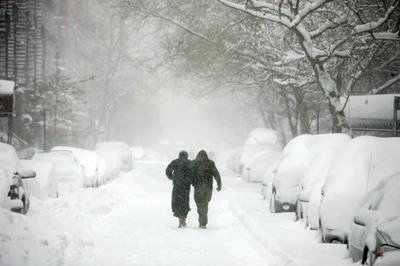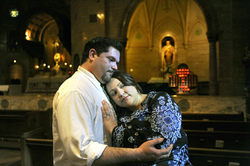
“Snowmageddon” had a big impact on America’s churches — not just in the parking lot, but also in the collection basket:
Oh, the weather outside has been frightful, meaning that fewer Catholics have braved a trek to their churches during a series of weekend winter snowstorms.
This means in turn that the Sunday offertory revenue is down, creating a hole in parish budgets while at the same time snowstorm-related expenses pile up.
A series of storms have socked in large chunks of the mid-Atlantic region this winter. The first took place Dec. 19, the Saturday before Christmas. A second storm, not as large as the December blast, happened Jan. 30, another Saturday. But an epic snowfall, registering record totals in Baltimore and Philadelphia and dumping massive amounts of snow throughout the mid-Atlantic, started Feb. 5, a Friday, and didn’t end until nearly 24 hours had passed. The region was hit again Feb. 10.
Bishops in many of the affected dioceses dispensed Catholics of the obligation to attend Mass those weekends, as safety considerations took precedence.
But as Catholics were missing from the pews, so too were their offertory envelopes from the collection baskets.
“Gone” was the word Father Mark Hughes used to describe the missing offertories.
Of the weekends affected by the storms, the offertories “all together would not add up to one Sunday,” said Father Hughes, pastor of Holy Redeemer Parish in Kensington, Md., a Washington suburb.
A few parishioners double up on their offertories if they miss a week, he added. And some parishioners keep current by contributing on a monthly basis “if they’ve already paid,” Father Hughes said. “Then you have the people who throw in the cash. That’s gone.”
And, as the Washington Post reported, it wasn’t just a Catholic problem:
The historic snowfalls have messed with the region’s spiritual rhythm, forcing people to rejigger routines and rituals of an intimate sort. Bible studies are falling behind. Non-singers are being pulled into choir duty. With three of the four big storms coming on weekends, houses of worship have been especially hard hit.
The challenges have demanded spiritual scrappiness.
Tamara Miller, 62, was expecting to go to synagogue on Wednesday, the third anniversary of her father’s death, to say the mandatory annual prayer for the dead. Miller knew the synagogue would have the quorum of 10 Jews required under Jewish law for certain obligations, including the reciting of the mourner’s prayer.
When she saw the blizzard, however, she thought of the 1990s TV show “Northern Exposure,” about a Jewish doctor living in Alaska, and the episode in which residents of the mostly American-Indian community scatter across a vast area to help him get the quota — called a “minyan” — so he could pray for his dead uncle.
Miller, who has lived in her Northwest Washington neighborhood for a couple years, sent a plea via the listserv of her 300-unit condo building. Within minutes, she had a few replies. One was from a neighbor who was in Philadelphia, saying he was also in mourning and offering to recite the prayer on her behalf at a synagogue there. By sundown, she had 11 people in her living room– the 10 required Jews and one non-Jewish neighbor with a cheesecake.
“Perhaps our paths will never cross again. Maybe, just maybe, we shared a moment of faith on the worst blizzard in a hundred years,” Miller, a rabbi and spiritual counselor, wrote in a letter of thanks. “The act of giving is an act of faith.”
Events of major religious significance were postponed or cancelled. Truro Church, a conservative Anglican congregation in Fairfax, had to cancel a celebration that was to be held in honor of one of Anglicanism’s global champions, Nigerian Archbishop Peter Akinola. The Hindu Temple of the Metropolitan Area had to reschedule its observance of the major festival of Maha Shivaratri, when hundreds of people are usually at the Adelphi temple all night celebrating and worshipping Lord Shiva.

